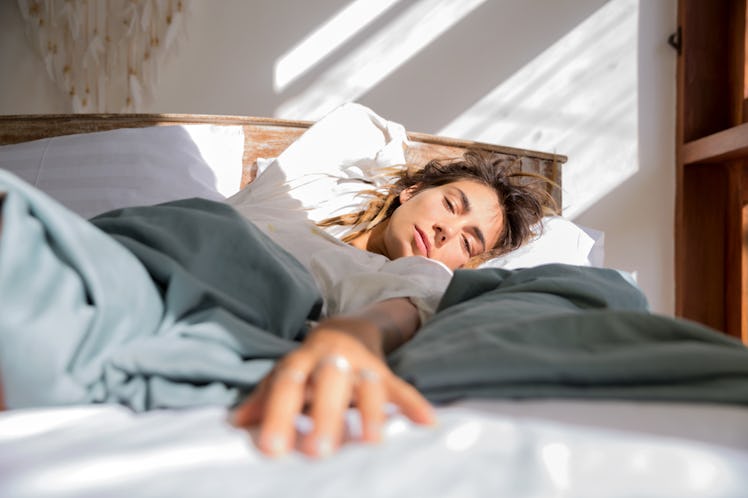
The Best Sleeping Position For Your Posture Might Be The One You Like The Least
It's no secret that many of us spend a lot of the day at a desk sitting down, and perhaps even more time looking down at our phones. These things don't do any favors for our health, or more specifically, our posture. But it's important to consider your posture in all your everyday activities if you want to improve it. While you might think about your alignment when you're sitting, and as you go about your day, you should also keep it in mind while you sleep. The best sleeping position for your posture is going to be one that puts the least amount of strain on your back, and ensures that you sit up straight all day, every day.
Just to be clear, maintaining good posture and back alignment really is a much more important aspect of your physical health than you might give it credit for. It can basically have an effect on everything in your body, including joint and ligament health, and your flexibility, just to name a couple. Believe it or not, good posture can even help you feel less sleepy throughout the day.
A couple of indicators that your posture might need a little tending to are things like stiff or sore muscles and aches, lack of flexibility, and frequent injuries. And as for your posture during the day? Keeping little things in mind, like making sure your chin is parallel to the floor, and your shoulders aren't hunched over or scrunched toward your ears, can all make a pretty big difference.
But when you sleep, it may be best for your posture to rest in a position that maintains the curvature of your lower spine.
The Australian physical therapy resource Physio Works recommends either lying on your back with a pillow under your knees, or on your side with your knees slightly bent. They do not, however, recommend sleeping in the fetal position, which is when your knees are curled in toward your chest, as that positioning apparently overextends your back, and can even constrict your breathing. Physio Works does say, though, that there are certain back conditions where sleeping in the fetal position might be preferable, so the best thing to do is check in with your own doctor or physical therapist about what's ideal for you and your body.
The National Sleep Foundation basically echoes that suggestion, saying that sleeping on your back is the way to go for keeping your spine straight and healthy.
This helps set your posture on a healthy, comfortable track for the night ahead and beyond. Plus, sleeping on your back allows for a mostly neutral position for your back, neck, and head, so nothing's getting crunched in a weird or uncomfortable way while you snooze. That being said, according to the National Sleep Foundation, only eight percent of people report sleeping on their backs. Most people either sleep on their sides or in the fetal position (hello, it me).
If you happen to be one of the many side sleepers out there, fret not. One suggestion from The Cleveland Clinic for making the side-sleeping position more back- and posture-friendly is to keep your neck and chin in a neutral position, and make sure that your ear lines up with your shoulders, sort of like you are "looking at the horizon," Andrew Bang, DC, a chiropractic specialist, told Cleveland Clinic. You can also try to put a pillow between your knees, which can help keep your spine straight. Moving around a bit when you sleep is also not a bad idea, and is said to be a positive habit for joint mobility.
For the most part, it's widely reported that sleeping on your stomach is the worst position for your back, neck, and overall posture.
When you're asleep on your tummy, you're unable to reach a neutral position for your back and spine, so it's encouraged that if you are, indeed, a tummy sleeper, you should try your best to shift toward a back or side position.
Another thing that people who sleep on their stomachs may want to watch out for, The Cleveland Clinic says, is the position of your legs. Try not to bring either of your legs up toward your ear, because doing so can really make things curve in your spine in a way that's just not healthy at all for your lower back, or even your hips.
Sweet dreams everyone, and here's to better posture!